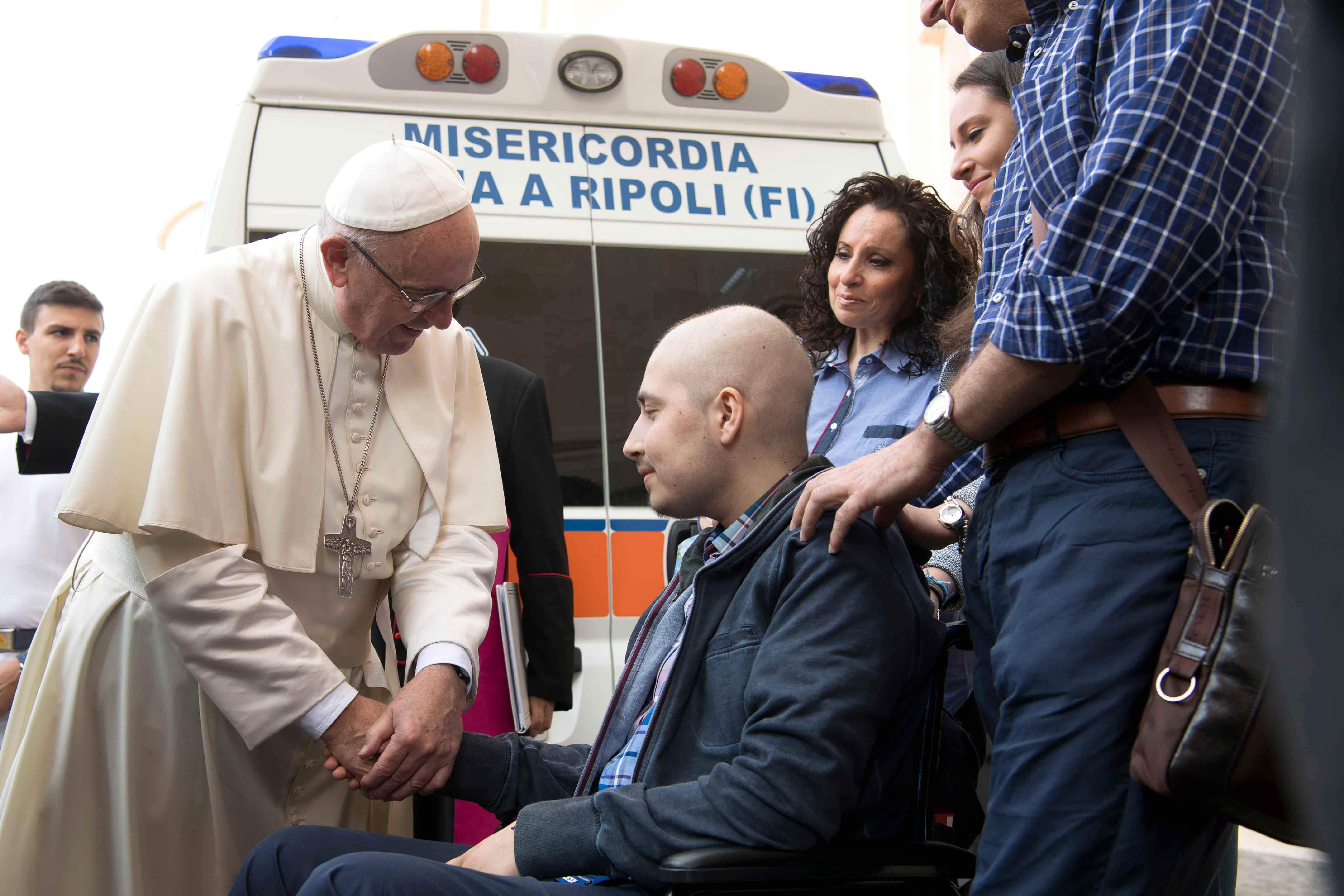Message
“Amazement at what God has accomplished: ‘The Almighty has done great things for me…” (Lk 1:49)”, it’s the theme chosen this year by Pope Francis. When sick people are involved, “balances and difficulties” cannot be the only criteria and the body of a man lying on a bed, like Christ lain on the Cross, does not alter his inalienable dignity! Also the proliferation of technology applied to treatment is a resource with a dual scope: while on the one side it is necessary and useful, on the other it may cause the removal of healthcare workers from caring for the sick, and perhaps, leaving them in the hands of dubious procedures, it may become an obstacle to the relationship between the healthcare worker and the patient that could combine technology with personal care.

On the occasion of the XXV World Day of the sick, on the theme: “Amazement at what God has accomplished: ‘The Almighty has done great things for me…” (Lk 1:49)”, the Pope released a special Message. As on the first Day, also this year it will be celebrated in Lourdes, a place of hope and grace for all the sick; for this reason “even now”, Pope Francis writes, “I am spiritually present at the grotto of Massabielle, before the statue of the Immaculate Virgin.” Considering the great respect with which the Holy Virgin spoke to Saint Bernadette, the Pope “reminds us that every person is, and always remains, a human being, and is to be treated as such. The sick and those who are disabled, even severely, have their own inalienable dignity and mission in life. They never become simply objects. If at times they appear merely passive, in reality that is never the case.” I consider this a central passage of this year’s message, also in the light of the present historical-cultural circumstance marked by a grave anthropological crisis that denies the primacy of man and that ever more often sacrifices the most fragile among us to the altar of personal profit. That is to say,
When sick people are involved, “balances and difficulties” can’t be the only criteria, and the body of a man lying on a bed, like Christ lain on the Cross, does not alter his inalienable dignity!
These are precious indications also for our Country that have to come to grips with the end-of-life theme. We stand behind the Pope’s Prayer to the Immaculate, asking for “the grace always to relate to the sick as persons who certainly need assistance, at times even for the simplest of things, but who have a gift of their own to share with others.” What is the gift that the sick person can share even when he is immobile in his bed? Witnessing the ruins caused by the Second World War, Dietrich Bonhoffer wrote: “Every Christian community must realize that not only do the weak need the strong, but also that the strong cannot exist without the weak.”
Caring for the fragile, especially when their fragility is extreme, has the potential to make society less cruel and inhumane. And hence, when faith illuminates life, recognizing in the faces of the sick the face of Christ who saves the world becomes a mystical experience capable of bringing, those who have humbleness to do so, into close union with God.
The Pope recalls the precious commitment of health workers: “The solidarity shown by Christ, the Son of God born of Mary, is the expression of God’s merciful omnipotence, which is made manifest in our life – above all when that life is frail, pain-filled, humbled, marginalized and suffering – and fills it with the power of hope that can sustain us and enable us to get up again.” Solidarity means closeness, presence, therapeutic accompaniment and support: an invitation
To consider the sick person not as a burden but as a travelling companion in need of support
For even in the dramatic moments of his life may he perceive through the closeness of his brothers, that his life is always “very good.” (Gen. 1:31). The Pope is right to recall the challenges of present day healthcare and technology. The proliferation of technology applied to treatment is a resource with a dual scope: while on the one side it is necessary and useful, on the other it may cause the removal of healthcare workers from caring for the sick, and perhaps, leaving them in the hands of dubious procedures, it may become an obstacle to the relationship between the healthcare worker and the patient that could combine technology with personal care. The Holy Father expressed the hope that “On this World Day of the Sick, may we find new incentive to work for the growth of a culture of respect for life, health and the environment. May this Day also inspire renewed efforts to defend the integrity and dignity of persons, not least through a correct approach to bioethical issues, the protection of the vulnerable and the protection of the environment.”
(*) director of CEI National Office for Health Pastoral Care